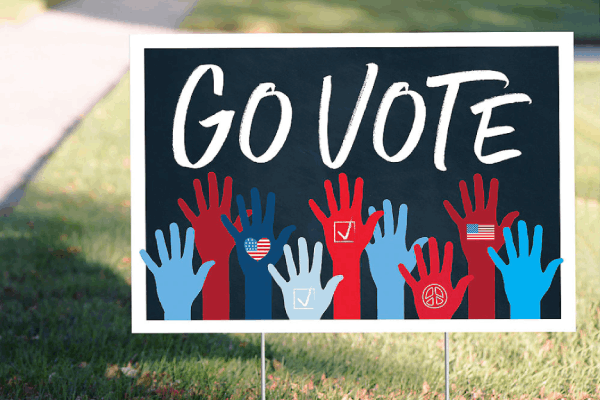
Displaying Non-Commercial & Political Signs in an Election Year
If you are wondering how there are still four months left in 2020, you are not alone. But it is not over yet, we still have another quarter to go and the Presidential election is just around the corner. Everywhere you turn, click, or scroll, you see the flash of red, white, and blue, you hear the chants – “Keep America Great”, and see the streets lined with people holding up Biden Harris signs. Homeowners around the country are showcasing their opinions in their front yard for everyone to see, but as a director of an association, you may be wondering, can members display signs or fly flags endorsing a political candidate in our community? In California, yes. Pursuant to California Civil Code §4710, members have the right to display signs or fly flags [See also Civil Code §4705] endorsing a political candidate provided the sign is located entirely on their separate interest i.e. posted or displayed from the yard, window, door, balcony or outside wall of the same.
Under §4710, an association’s governing documents cannot outright prohibit the posting or displaying of noncommercial signs, posters, flags, or banners on or in a member’s separate interest, unless it is required for the protection of public health or safety, or it would violate a local, state, or federal law. However, §4710 does set forth restrictions on any such noncommercial sign, poster, flag or banner. For example, it can be made of paper, cardboard, cloth, plastic, or fabric, but may not be made of lights, roofing, siding, paving materials, flora, or balloons, or any other similar building, landscaping, or decorative component, and may not be painted on architectural surfaces. §4710 also provides that an association can prohibit noncommercial signs and posters that are more than nine square feet in size and noncommercial flags or banners that are more than 15 square feet in size.
Naturally, you might be wondering what this means for your association. To put it simply, an association cannot prohibit members from posting signs and the like or flying flags on or in a member’s separate interest unless: (1) it violates the law (Boards should keep in mind that many municipalities have specific laws related to posting election signage); (2) prohibition is required for the public health or safety; (3) it is made of a material specifically prohibited by §4710; or (4) it fails to comply with the dimensions set forth in §4710.
It may seem that the foregoing has eliminated the Board’s ability to adopt rules and regulations related to noncommercial signage; however, an association can still enact rules and regulations related to posting signs, posters and banner and flying flags. Specifically, an association’s governing documents can: require members to obtain Board approval prior to the display of such signage; provide specific locations where signage or flags can be hung; require that flag poles be a certain height and made of a certain material; provide that flags may only be flown during specific hours; require that flags, signs, posters and banners be kept in good condition; and limit the number of signs or flags that may be displayed.
Pursuant to the foregoing, members of an association have the right to display noncommercial signs and flags, including signs and flags endorsing a political candidate provided they comply with the requirements set forth in California Civil Code §4710 and comply with any rules and regulations in effect. Boards should keep in mind that any rules not currently in effect in their association will be subject to the notice requirements set forth in California Civil Code §4360.
Boards should also be mindful of another potential association issue that could come up as a result of the Presidential election – the rights of its members to utilize common area facilities for events and activities related to political speech and assembly. These rights are pursuant to California Civil Code §4515 which, among other rights, protects political speech and assembly rights by nullifying any provision of the association’s governing documents that prohibit peacefully assembling or meeting, at reasonable hours and in a reasonable manner for purposes related to common interest development living, association elections, legislation, election to public office, or the initiative referendum or recall process. §4515 further invalidates any provision requiring a member or resident to pay a fee, make a deposit, obtain liability insurance, or pay the premium or deductible on the association’s insurance policy, in order to use common area facilities for any such meeting described above. Given that we are currently facing a global pandemic, COVID-19, the foregoing rights of members to peacefully assemble in the common areas of an association directly contradict current state and local guidelines prohibiting gatherings. Assuming an association has enacted emergency rules to close any common area facilities as a result of COVID-19 pandemic, we believe an association can decline to open such common area facilities for those members seeking to hold political assemblies or meetings pursuant to §4515, provided, of course that the association did so uniformly; however, if such decision is challenged by a member, the court may not agree. Assuming a member prevented by an association from engaging in the foregoing activities brings a civil or small claims court action, and the court does not agree with the association’s decision, it may assess a civil penalty of not more than five hundred dollars ($500.00) for each violation.
If your association would like to enact rules related to the display of noncommercial signs, including those that endorse political candidates, or emergency rules related to the closure of common area spaces as a result of COVID-19, our office would be happy to assist.



